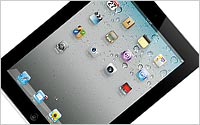Tablet Demand Explodes, Creates Global Phenomenon
- by Mark Walsh @markfwal, March 6, 2012

A new Forrester report projects that 112.5 million U.S. adults -- one-third of the adult population -- will own a tablet by 2016, up from a prior forecast of 82.1 million. The upward revision is partly the result of the successful rollouts of the Kindle Fire and Nook Tablet during the 2011 holiday season.
On an annual basis, estimated U.S. tablet sales of 37.9 million this year are expected to grow to 60.3 million in 2016.
On the eve of the expected release of the iPad 3, the report also showed that 61% of people surveyed said they are considering buying the Apple tablet, compared to 24% who are looking at the Kindle Fire. But the survey was fielded last September, before the November release of the Amazon tablet. The percentage of people who want a Kindle Fire could be higher by now.
While the Amazon tablet has benefited from being priced $300 less than the iPad, the Forrester study suggested price wasn’t the only consideration for tablet buyers.
“For better or for worse, price is becoming a more important factor in tablet choice. But it’s not the only factor, or even the primary one. Forrester’s data shows that the top reason consumers don’t buy tablets isn’t because of price, or technology -- it’s because they say “I don’t think I need it,” wrote Forrester analyst and study author Sarah Rotman Epps in a blogpost Tuesday.
She added that the services a device provides -- what you can do with it -- are also critical. That's why Apple, Amazon, and Barnes & Noble have succeeded in the U.S., while pure hardware plays have failed. Still, the report suggests Apple should introduce a smaller, cheaper iPad this year to ward off competition from Amazon. Speculation about the forthcoming iPad 3 is that it will have the same 9.7-inch screen size and carry the same $499 price tag as the current model.
Forrester also points out that Google has gained share in the tablet market, thanks to the success of the Kindle Fire -- which sold an estimated 5.5 million units in the fourth quarter -- and the Nook Tablet. Both use a version of the Android platform. The report suggests that manufacturers like Samsung, Lenovo and HTC should abandon Android in favor of Windows to take advantage of Microsoft’s still-strong consumer brand and corporate acceptance.
In addition to consumer adoption, Forrester notes that tablets are also gaining ground in the workplace. While people mainly use them in the living room, 37% of U.S. tablet owners bring them to work. Tablets are also a global phenomenon, with only 43% of the 55 million iPads sold through the end of Apple's last fiscal quarter bought within the U.S. The remainder went to consumers and businesses in the other 90 countries where the iPad is available.
The BRIC countries (Brazil, Russia, India, and China) and Mexico actually led demand for wanting to use a tablet for work -- and being willing to share the cost of the device with their employers, according to Forrester.



With growth happening this fast, what chance will Microsoft have when it finally has Windows 8 phones and tablets on the market? At this sales pace, by then Microsoft will be forced to displace iOS or Android products, and that will be a very difficult and expensive proposition. Despite previewing Win 8 last week, I agree with Forbes mag that the game is already too far along for Microsoft, leaving it playing "bet the company" on Win 8 - and it's a lousy bet http://onforb.es/zEbLfz
I can attest to this. Our company is overwhelmed with requests. This is a good thing! www.padvertisement.com